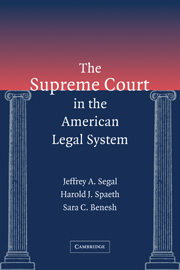8 - The U.S. District Courts
Published online by Cambridge University Press: 05 June 2012
Summary
The legal battle over Election 2000 eventually found its way into the federal courts. Hard to believe that an issue so closely associated with state autonomy – elections – would find entry to the federal court system. The lower federal courts, however, were not particularly sympathetic to the claims being made.
On November 11, 2000, Bush and Cheney, along with some Florida voters, filed an emergency motion for a temporary restraining order to halt the recounts that were progressing in Broward, Miami-Dade, Palm Beach, and Volusia counties, alleging that said recounts would compromise accuracy (because of the discretion entailed in manual recounts) and skew the results (because the counties being recounted might be more favorable to one candidate than the other), thereby violating the First and Fourteenth Amendments to the Constitution. Judge Donald M. Middlebrooks, district court judge for the Southern District of Florida, decided that the claimants had no cause of action and that intervention by a federal court at this point would be inappropriate. Citing the Florida statutory provisions over elections and recounts (as mentioned in Chapter 7), Judge Middlebrooks argued that all procedures were followed in accordance with the law of the state of Florida: An automatic recount was triggered by the close margin of victory (less than 0.5 percent); candidates or parties were able to (and the Democratic Party of Florida did) submit written requests for hand counts within seventy-two hours of the election and, if granted, the hand count would encompass at least three precincts or 1 percent of the vote, whichever is greater; if the initial recount indicates a difference that could affect the outcome of the election, a manual recount of all precincts is triggered.
- Type
- Chapter
- Information
- The Supreme Court in the American Legal System , pp. 187 - 212Publisher: Cambridge University PressPrint publication year: 2005



